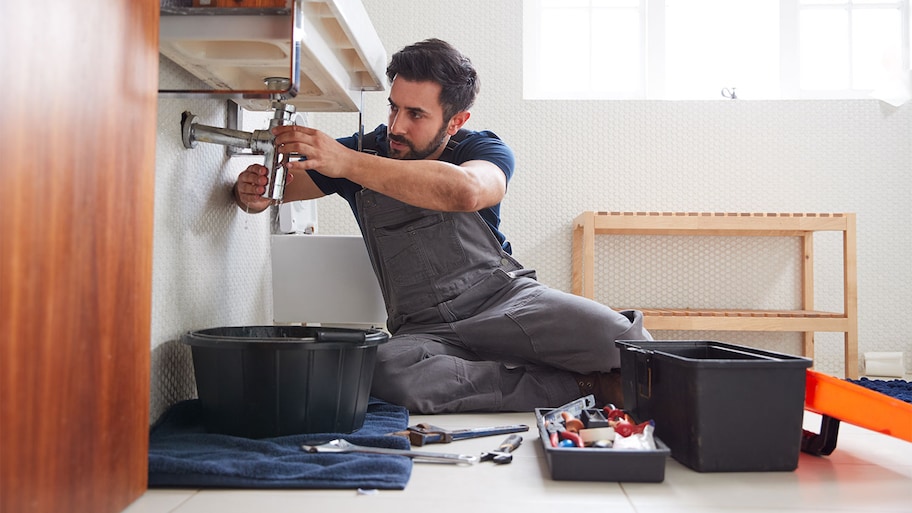Plumbers in the UK can be expensive due to factors like,
- High Overhead Costs,
- Specialized Skills,
- And the Demand for Their Services.
Becoming a licensed plumber isn’t just about fixing leaks and unclogging drains—it’s a serious business that demands specialized skills and extensive training.
Plumbers undergo tough training and learning on the job to ensure they know how to handle the hard parts of their work.
Factors Influencing Plumbing Costs

Skill and Expertise:
Training and Certification Requirements:
- Plumbers often need formal education and training to acquire the necessary skills. This can involve vocational programs, apprenticeships, or trade schools.
- Certification requirements vary by location but are often necessary to ensure a plumber’s competence and knowledge of safety standards.
Experience and Specialized Skills:
- Experienced plumbers may command higher fees due to their track record and proficiency.
Tools and Equipment:
Investment in High-Quality Tools:
- Plumbers require various specialized tools for different tasks. Investing in high-quality tools can increase initial costs but may lead to efficiency and longevity.
- Quality tools can contribute to the precision and quality of work, potentially impacting the overall cost.
Maintenance and Upgrading Costs:
- Tools are regularly maintained to ensure they remain in good working condition.
- Upgrading tools to keep up with technological advancements or meet new industry standards may incur additional costs.
Regulatory Compliance:
Adherence to Industry Standards and Regulations:
- Plumbers must adhere to local, state, and national plumbing codes and regulations. Ensuring compliance may require additional time and resources.
- Keeping abreast of industry standards is essential for ensuring compliance and delivering high-quality work.
Licensing and Insurance Requirements:
- Plumbers often need licenses to operate legally. Obtaining and maintaining these licenses can involve fees and ongoing education.
- Insurance coverage, including liability and worker’s compensation, is essential for protecting both the plumber and the client. The costs associated with insurance may impact pricing.
Understanding these factors helps both plumbing professionals and consumers estimate and justify plumbing costs.
Additionally, consumers benefit from hiring well-trained, experienced plumbers who adhere to regulations, ultimately contributing to the safety and longevity of plumbing systems.
Supply and Demand Dynamics
Demand for Plumbing Services:
Population Density and Urbanization:
- In crowded urban areas, there is typically greater demand for plumbing services.
- For instance, a city with a population density of 10,000 people per square mile might experience more frequent plumbing issues than a rural area with a density of 100 people per square mile.
Explanation: Higher population density often means more buildings, infrastructure, and plumbing systems, increasing demand for plumbing services.
Seasonal Variations in Demand:
- Plumbing services may experience a surge in demand during specific seasons.
- For example, a plumbing company might see a 20% increase in service requests during winter due to issues like frozen pipes.
Explanation: Seasonal factors, such as cold weather leading to pipe bursts, can significantly impact the demand for plumbing services.
Limited Skilled Workforce:
Shortage of Qualified Plumbers:
- In some regions, there may be a shortage of qualified plumbers.
- For instance, if the demand for plumbing services requires 1,000 plumbers, but only 800 are available, there is a 20% shortage.
Explanation: The shortage of skilled plumbers can result from factors like retiring professionals, insufficient training programs, or a lack of interest in pursuing plumbing as a career.
Impact on Service Availability and Pricing:
- With a limited workforce, the availability of plumbing services may be constrained. This scarcity could lead to a 15% increase in service pricing due to higher demand and lower supply.
Explanation: Limited availability of skilled plumbers can result in increased competition for their services, leading to higher prices for consumers.
Understanding these supply and demand dynamics is crucial for both plumbing service providers and consumers.
Operational Overheads
Business Maintenance Costs:
Rent, Utilities, and Office Expenses:
- Typically, a plumbing business may face monthly expenses of around $5,000 for rent, utilities, and office costs.
Explanation: These costs cover the physical space where administrative tasks are conducted, utilities to keep the business running, and various office supplies necessary for day-to-day operations.
Staff Salaries and Benefits:
- If a plumbing company employs five staff members, including plumbers and administrative staff, the total monthly salary and benefits might amount to $25,000.
Explanation: Salaries and benefits contribute significantly to operational costs. Skilled plumbers command higher salaries, and benefits like health insurance and retirement plans further add to the overall expense.
Insurance and Liability:
Costs Associated with Insuring Against Potential Damages:
- A plumbing business may spend $8,000 annually on insurance coverage to protect against property damage, equipment loss, and other unforeseen events.
Explanation: Insurance is a critical operational expense to safeguard the business against potential financial losses arising from accidents, natural disasters, or equipment failures.
Liability Coverage and Its Impact on Pricing:
- Including liability coverage might contribute an additional 5% to the overall cost of a plumbing project. For example, a $1,000 plumbing service might have an added $50 to cover liability insurance.
Explanation: Liability coverage is essential to protect both the plumber and the client in case of accidents or damages during the service. The cost of this coverage is factored into the overall pricing structure.
Understanding and managing these operational overheads is crucial for plumbing businesses to ensure sustainability and provide transparent pricing to clients.
Consumers benefit from knowing that the costs associated with maintaining a business, ensuring staff well-being, and managing risk are part of the overall service pricing structure.
Materials and Quality
Cost of Quality Materials:
Use of Durable and Reliable Plumbing Materials:
- Investing in high-quality materials may increase the cost of a plumbing project by 20%.
- For example, if a basic plumbing repair using standard materials costs $500, opting for premium materials may raise the cost to $600.
Explanation: Quality materials, such as corrosion-resistant pipes or fixtures, may have a higher upfront cost but contribute to the longevity and durability of the plumbing system, reducing the likelihood of future issues and repairs.
Impact on the Longevity of Repairs and Installations:
- Using quality materials can extend the lifespan of plumbing installations by 30%.
- For instance, a water heater installation that typically lasts 10 years might last 13 years with high-quality materials.
Explanation: While quality materials may incur higher initial costs, they can lead to fewer repairs and replacements over time, ultimately providing value and cost savings to the customer.
Pricing Transparency:
Breakdown of Material Costs for Customers:
- Providing a detailed breakdown of material costs on the invoice allows customers to see that, for example, $300 of a $1,000 plumbing service is attributed to materials.
Explanation: Transparent pricing helps customers understand the overall cost components, fostering trust and allowing them to make informed decisions.
Establishing Trust Through Transparent Pricing:
- Plumbing businesses that prioritize transparency may see a 15% increase in customer satisfaction and repeat business.
Explanation: Clear communication about material costs and overall pricing builds trust between the plumbing service provider and the customer.
Customers appreciate knowing where their money is going, and the use of quality materials contributes to the reliability and longevity of plumbing installations and repairs.
Customer Service and Satisfaction

Response Time and Emergency Services:
24/7 Availability and Rapid Response Times:
- A plumbing service that guarantees 24/7 availability and a rapid response time may charge 30% more for emergency services compared to standard appointments.
Explanation: The round-the-clock availability and quick response to emergency calls contribute to higher operational costs, including overtime pay for staff, justifying the increased pricing for urgent plumbing needs.
Higher Costs Associated with Emergency Services:
- Emergency plumbing services might cost an average of $150 per hour, while standard services during regular business hours may cost $100 per hour.
Explanation: The higher costs for emergency services account for the additional expenses incurred by the plumbing business to address urgent issues promptly, ensuring customer satisfaction in critical situations.
Guarantees and Warranties:
Standing Behind the Quality of Work:
- Offering a 2-year warranty on plumbing installations may contribute an additional 5% to the overall project cost.
Explanation: Providing guarantees and warranties demonstrates confidence in the quality of work. The associated cost reflects the potential need for future corrections or repairs covered under the warranty.
Long-Term Customer Satisfaction and Loyalty:
- Plumbing businesses that prioritize guarantees and warranties may experience a 20% increase in customer satisfaction and loyalty.
Explanation: Customers value the assurance that comes with warranties. Knowing that a plumbing service stands behind its work fosters long-term satisfaction and increases the likelihood of repeat business and positive referrals.
Making customers happy is important, especially when things are urgent.
If a plumbing service responds quickly and promises to fix things, even if it costs a bit more, it helps customers trust them more. This builds loyalty and makes the plumbing business look good in the long run.
FAQs
Why do plumbers in the UK charge higher rates?
Plumbers charge rates reflecting their specialized skills, extensive training, and the costs of running a licensed and insured business.
What contributes to the high cost of plumbing services?
Factors include licensing and certification requirements, insurance coverage, investment in tools and equipment, business overheads, and the need for quality assurance.
Are emergency plumbing services more expensive?
Yes, emergency plumbing services often come with higher rates due to immediate response requirements and off-hours scheduling.
Do plumbers charge for travel time and fuel costs?
Some plumbers may include travel time and fuel costs in their service fees, especially for jobs requiring them to travel significantly.
Why is plumbing expertise considered expensive?
Plumbing requires specialized skills and knowledge, and plumbers undergo extensive training to ensure the quality and safety of their work.
Are guarantees on plumbing work worth the higher cost?
Yes, guarantees on plumbing work are generally worth the higher cost. They assure customers and demonstrate the plumber’s confidence in the quality of their work.
In the long run, guarantees can contribute to customer satisfaction, loyalty, and peace of mind.
Do plumbers in the UK have specific licensing requirements?
Yes, plumbers need to obtain licenses, and the process involves rigorous training and examinations to ensure competence and compliance with regulations.
How does insurance impact plumbing service costs?
Insurance impacts plumbing service costs by adding a specific financial burden. For instance, a plumbing business might spend $8,000 annually on insurance coverage, which includes liability and other types of insurance.
Why are specialized tools important in plumbing?
Specialized tools are essential for performing precise and efficient plumbing work. The investment in these tools contributes to the overall cost of services.
Is there a difference in pricing based on the time of day for plumbing services?
Yes, there may be a difference in pricing based on the time of day for plumbing services.
Emergency services or services provided during off-hours, such as evenings or weekends, often come with higher costs compared to standard services during regular business hours.
Do plumbers factor in business overheads in their pricing?
Yes, business overheads such as office space, utilities, and administrative expenses are factored into the service charges, contributing to the overall cost of plumbing services.
Conclusion
To sum up, fixing plumbing stuff costs money, and many things decide how much. It depends on how good the plumber is, what tools they use, following the rules, how many people need help, and other business costs.
Plumbers need to learn a lot and use good tools; sometimes, there aren’t enough skilled workers. Telling customers the price clearly, using good materials, and being quick and helpful make customers happy.
This helps the plumbing business do well for a long time. So, plumbers need to balance all these things to do a good job and keep customers happy.

